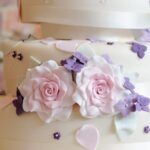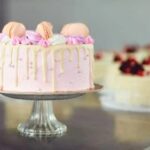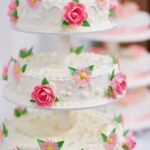Cake decorating is an art form that brings joy and delight to any occasion. Whether it’s a birthday, wedding, or anniversary, a beautifully decorated cake is often the centerpiece of the celebration. At the heart of this artistry is the skilled and creative professional known as a cake decorator.
In this article, we will explore the world of cake decorating and all that it encompasses. From skills and qualifications to training options and career opportunities, we will delve into the ins and outs of this exciting field.
A cake decorator is someone who takes an ordinary cake and transforms it into a work of art. They use various techniques, tools, and ingredients to create visually stunning designs that not only look incredible but also taste delicious. A talented cake decorator possesses a strong eye for detail, a flair for creativity, and the ability to work with precision.
The importance of a cake decorator cannot be understated. Their creations not only bring joy to individuals on their special occasions but also leave lasting memories for years to come. From fondant flowers to intricate piping designs, their skillful hands can turn a simple dessert into a masterpiece. So join us as we dive into the world of cake decoration, exploring the intricacies and nuances that make this craft so special and important in our lives.
The Role of a Cake Decorator
The role of a cake decorator is vital in transforming a plain, baked cake into a visually stunning and appealing masterpiece. Cake decorators possess a unique set of skills and qualifications that make them capable of creating intricate designs and decorations using various techniques and tools.
One of the most important skills that a cake decorator must have is artistic creativity. They should have an eye for detail, color matching, and symmetry to bring their vision to life. Additionally, having good manual dexterity is crucial for handling delicate decorations such as fondant or piping intricate designs. Patience and attention to detail are also essential as even the smallest error can affect the overall appearance of the cake.
A cake decorator should also be well-versed in different baking techniques and recipes. This knowledge enhances their ability to create custom cakes that meet the specific needs and preferences of their clients. It is important for decorators to understand how different flavors, textures, fillings, and frostings work together to achieve the desired taste and presentation.
In terms of qualifications, many cake decorators begin by acquiring an education or training in culinary arts or baking. This formal training equips them with fundamental knowledge in pastry making, food safety practices, ingredient selection, cake construction, and decoration techniques. However, it is worth noting that experience plays a significant role in developing advanced skills as a decorator. Oftentimes, many aspiring decorators start by assisting experienced professionals or working at bakeries to refine their craft before launching their own careers.
Overall, becoming a successful cake decorator requires both natural talent and dedication to honing one’s craft through continued practice and learning. By possessing artistic creativity along with practical baking knowledge and technical skills, decorators can create visually stunning cakes that leave lasting impressions on clients and guests alike.
Types of Cake Decorating Techniques and Styles
Cake decorating is a creative and artistic field that offers a wide range of techniques and styles to elevate a simple cake into a work of art. Whether you are a professional cake decorator or a hobbyist looking to enhance your skills, understanding the various types of cake decorating techniques and styles can help you create stunning designs that will impress both clients and guests.
Buttercream Frosting: Classic and Versatile
One of the most popular cake decorating techniques is using buttercream frosting. Buttercream is made by creaming butter and sugar together until light and fluffy, creating a smooth and creamy texture that is easy to work with. This type of frosting can be easily tinted with food coloring to achieve vibrant colors, making it perfect for creating decorations such as flowers, rosettes, borders, and intricate piping details.
Fondant: The Smooth Canvas
Fondant is another widely used technique in cake decoration. It is a pliable icing made from marshmallows or powdered sugar that can be rolled out thinly and draped over a cake to create a smooth surface. Fondant provides the perfect canvas for intricate designs, sculpted figures, and realistic-looking decorations like bows or ribbons. It can also be flavored or colored to match any theme or design.
Painting on Cakes: Edible Artwork
For those who want to take their cake decorating skills to the next level, painting on cakes offers endless possibilities for creativity. Using edible food coloring or gel paints, decorators can create stunning designs on fondant-covered cakes or directly onto the surface of buttercream frosted cakes. This technique allows for intricate details, shading, blending colors, and even replicating famous artworks.
From traditional buttercream piping to fondant sculptures and edible artwork, there are countless techniques and styles in cake decorating that cater to different tastes and preferences. Aspiring cake decorators can experiment with these techniques and develop their own unique style, combining various methods to create visually stunning and delicious masterpieces.
Tools and Equipment Every Cake Decorator Should Have
A cake decorator’s toolkit is just as important as their skills and qualifications when it comes to creating beautiful and professional-looking cakes. Here are some essential tools and equipment that every cake decorator should have in their arsenal:
- Piping Bags and Tips: Piping bags are used to pipe buttercream, royal icing, or other frostings onto cakes. They come in various sizes and materials, such as disposable plastic or reusable cloth. Piping tips are attached to the end of the bag to create different shapes and designs.
- Offset Spatulas: These spatulas have a bent or angled blade that makes it easier to spread frosting on cakes smoothly. They are especially useful for icing the sides of round cakes.
- Turntable: A turntable is a rotating platform that allows decorators to easily spin and maneuver cakes while decorating them. This ensures even frosting application and precise decorations.
- Bench Scraper: Also known as a dough scraper, this tool has a flat edge that can be used to smooth out the sides of a cake or remove excess icing from the top.
- Cake Leveler: A cake leveler is used to slice off the top dome of a cake, ensuring an even surface for layering and decorating.
- Fondant Rolling Pin: When working with fondant, a special rolling pin with non-stick surfaces is essential to achieve an even thickness throughout.
- Decorating Brushes: Soft-bristled brushes are handy for adding color or texture to cakes using edible dusts, paints, or glazes.
- Modeling Tools: These tools help shape and mold edible decorations made from fondant or gum paste. They typically include various sizes of shaping, smoothing, and detailing tools.
- Airbrush Kit: An airbrush kit allows decorators to apply color gradients, shading effects, and intricate designs onto cakes using food-grade colors.
Having these tools at hand can significantly enhance a cake decorator’s ability to create stunning cakes. However, it is important for decorators to keep in mind that the quality and maintenance of these tools are crucial for achieving professional results. Regular cleaning and proper storage should be practiced to ensure longevity and prevent cross-contamination between various cake projects.
| Tool/Equipment | Description |
|---|---|
| Piping Bags and Tips | Used for piping buttercream, royal icing, or other frostings onto cakes. |
| Offset Spatulas | Bent or angled blades used to spread frosting on cakes smoothly. |
| Turntable | A rotating platform that allows decorators to easily spin and maneuver cakes while decorating them. |
| Bench Scraper | Used to smooth out the sides of a cake or remove excess icing from the top. |
Training and Education Options for Aspiring Cake Decorators
Training and education play a crucial role in shaping the skills and knowledge of aspiring cake decorators. While some individuals may possess natural artistic abilities, formal training can provide them with the techniques, principles, and industry insights needed to excel in this creative field.
Culinary Schools and Courses
Attending a culinary school or taking courses specifically focused on cake decorating is one of the most comprehensive ways to receive training as an aspiring cake decorator. These programs often offer hands-on experience, instruction in various decorating techniques, flavor combinations, and business management skills. Additionally, culinary schools may also provide internship opportunities that allow students to work alongside industry professionals and gain practical experience.
Workshops and Classes
For those who prefer a more flexible learning approach or want to enhance their existing skills, attending workshops or classes can be highly beneficial. Many local community centers, culinary supply stores, and professional organizations offer short-term courses covering different aspects of cake decoration.
These workshops typically focus on specific techniques such as piping flowers, fondant sculpting, or working with buttercream. Attending these sessions not only allows aspiring decorators to learn from experienced instructors but also provides an opportunity to network with others who share their passion for cake decorating.
Online Resources
The rise of digital technology has made education accessible from anywhere at any time. Aspiring cake decorators can take advantage of online resources such as video tutorials, virtual classes, and webinars provided by professional decorators or reputable websites dedicated to cake decoration. These resources allow individuals to learn at their own pace and frequently offer a wide range of topics covering everything from basic decorating techniques to advanced design principles.
Regardless of the educational route chosen, it’s important for aspiring cake decorators to continue practicing their skills regularly to refine their technique and develop their personal style. By staying up-to-date with current trends and continuously seeking new inspiration through workshops, classes, or online resources, aspiring cake decorators can ensure they are well-equipped to thrive in this creative and rewarding profession.
Tips and Tricks for Successful Cake Decoration
Successful cake decoration requires more than just technical skill and knowledge of various techniques. It also involves creativity, attention to detail, and the ability to think outside the box. In this section, we will explore some tips and tricks that can help aspiring cake decorators achieve stunning results.
One important tip is to plan ahead. Before starting any cake decoration project, it is crucial to have a clear vision of what the final product should look like. This includes considering the theme, color scheme, and overall design. By sketching out the design and creating a checklist of necessary materials and tools, you can ensure a smooth and efficient decorating process.
Another valuable tip is to invest in quality ingredients and tools. Using high-quality ingredients not only improves the taste of the cake but also makes it easier to work with during the decorating process. Similarly, having reliable tools such as piping bags, spatulas, and offset icing spatulas can make all the difference in achieving clean lines and smooth finishes.
Furthermore, being organized can greatly enhance your efficiency as a cake decorator. Create a designated workspace where all your tools, ingredients, and decorations are within reach. Keep everything neatly organized so that you can easily find what you need without wasting time searching for items.
Lastly, do not be afraid to experiment and try new techniques or designs. Cake decoration is an art form that allows for endless creativity. Be open-minded and willing to take risks – you may discover unique combinations or innovative methods that set your creations apart from others.
Implementing these tips and tricks into your cake decorating routine will help you develop your skills further and enhance your ability to create visually appealing cakes.
| Tips | Tricks |
|---|---|
| Plan ahead | Invest in quality ingredients |
| Create a designated workspace | Experiment and try new techniques |
Mistakes to Avoid as a Cake Decorator
As a cake decorator, it is important to be aware of the common mistakes that can occur during the cake decorating process. Avoiding these mistakes will not only help ensure successful and visually appealing creations, but also save time and resources. Here are some key mistakes to avoid as a cake decorator:
- Lack of planning: One of the biggest mistakes a cake decorator can make is not properly planning out the design and execution of a cake. This includes taking into account factors such as theme, color scheme, size, and any specific details or elements desired by the client. Without proper planning, a cake decorator may end up with a design that is lackluster or does not meet the client’s expectations.
- Rushing through the decorating process: Another common mistake is rushing through the decorating process in order to meet deadlines or accommodate last-minute requests. This can lead to sloppy workmanship, uneven frosting or icing, and overall poor quality in the final product.
- Over-complicating designs: While creativity is an asset in cake decorating, it is important not to overcomplicate designs by incorporating too many elements or techniques into one cake. This can result in cluttered and messy-looking cakes that lack focus or cohesion.
To avoid this mistake, it is crucial to have clear communication with the client from the beginning and gather all necessary information for the design process. Sketching out ideas and creating a timeline for each step of the decorating process can also help ensure everything runs smoothly.
To avoid rushing through the decorating process, it is important to prioritize time management and allow enough time for each step. Breaking down tasks into smaller chunks can make them more manageable and reduce the temptation to rush.
To avoid over-complicating designs, it is helpful to stick to one central theme or idea and build around it using complementary colors and simple yet impactful techniques. It is also essential to practice new techniques before attempting them on an actual cake to ensure proficiency and avoid any potential mishaps.
By being aware of these common mistakes and taking proactive steps to avoid them, cake decorators can enhance their skills, produce high-quality cakes, and create happy clients.
Challenges and Rewards of Being a Cake Decorator
Being a cake decorator comes with its own set of challenges and rewards. While the art of cake decorating can be incredibly fulfilling, it also requires a high level of skill, creativity, and attention to detail. In this section, we will explore some of the challenges that cake decorators may face as well as the rewards they can experience in their career.
Challenges
- Time Management: Cake decorating can be a time-consuming process, especially when handling custom orders or creating intricate designs. Cake decorators often have to work with tight deadlines while still ensuring high-quality results.
- Physical Demands: As a cake decorator, you may spend long hours standing, bending, and lifting heavy objects. This can put strain on your body and lead to physical fatigue or even injury if proper care is not taken.
- Client Expectations: Meeting clients’ expectations can be challenging since everyone has unique preferences and specific design requests. Communication skills are crucial in understanding the client’s vision and translating it into an aesthetically pleasing cake design.
Rewards
- Creativity: One of the most rewarding aspects of being a cake decorator is having the opportunity to express creativity through your designs. Each cake becomes a blank canvas where you can showcase your artistic abilities and bring joy to others through edible works of art.
- Emotional Satisfaction: Cake decorators often play a significant role in people’s celebrations and special moments such as weddings, birthdays, and anniversaries. The ability to create cakes that evoke happiness and appreciation from clients is incredibly gratifying.
- Continuous Learning: The field of cake decorating is constantly evolving with new techniques, trends, and materials emerging regularly. This provides ample opportunities for growth and learning as decorators continuously update their skills and expand their knowledge base.
Overall, being a cake decorator requires passion, patience, and perseverance in facing the challenges that come with this creative profession. Despite the difficulties, the rewards of translating ideas into beautiful edible creations and being part of people’s cherished memories make it all worthwhile.
Career Opportunities and Job Outlook for Cake Decorators
As cake decorating continues to gain popularity and become more recognized as an art form, the demand for skilled cake decorators is on the rise. With a variety of career opportunities available, individuals with a passion for creativity and an eye for detail can find success in this field.
One potential career path for cake decorators is working in bakeries or pastry shops. These establishments often have a designated cake decorating department where decorators can utilize their skills to create beautiful custom cakes for various occasions. From birthdays to weddings, cake decorators play a crucial role in ensuring that each customer’s vision comes to life.
Another career option is starting your own cake decorating business. With the increasing trend of elaborate and personalized cakes, there is a growing market for custom-designed creations. As a self-employed cake decorator, you have the freedom to unleash your creativity and tailor your services to meet the unique needs of your clients.
The job outlook for cake decorators is promising, with opportunities not only in traditional bakery settings but also in specialty shops, event planning companies, and even television shows or competitions centered around baking and cake decoration. Additionally, social media platforms provide an avenue for showcasing your work and attracting clientele from all over the world.
In conclusion, being a cake decorator offers numerous career opportunities and job security within the ever-expanding baking industry. The demand for skilled decorators continues to grow as people recognize the value of having beautifully crafted custom cakes for their special events.
Whether you choose to work in an established bakery or start your own business, this profession allows you to showcase your talent while creating delicious works of art that bring joy to others. So if you have a passion for baking and artistic flair, don’t hesitate to pursue a career as a cake decorator – it’s never too late to turn your passion into a rewarding profession.
Frequently Asked Questions
What is a cake decorator called?
A cake decorator is often referred to as a pastry chef or cake artist. These skilled professionals specialize in creating visually appealing designs on cakes using various techniques such as piping, fondant work, and sculpting.
They have a keen eye for detail and are able to transform an ordinary cake into a stunning centerpiece for any occasion. Cake decorators are also knowledgeable about different flavors, fillings, and frostings to ensure that the taste matches the impressive appearance.
How do you describe cake decorator on resume?
When describing a cake decorator on a resume, it is important to highlight their relevant skills and experience in the field of cake decoration. This can include mentioning their proficiency in various decorative techniques such as piping, airbrushing, or working with fondant and gum paste.
It is also beneficial to mention any experience in creating custom designs or working with specific themes. Including information about any formal education or training in pastry arts or culinary programs can further enhance the resume, demonstrating the candidate’s dedication to their craft.
What is the difference between a cake artist and a cake decorator?
Although the terms “cake artist” and “cake decorator” are sometimes used interchangeably, there is a subtle difference between the two roles. A cake decorator typically specializes in executing pre-designed cake decorations according to customer requests or established templates.
They focus on creating visually stunning cakes using various techniques but may not necessarily be involved in designing original creations from scratch.

Welcome to my blog about home and family. This blog is a place where I will share my thoughts, ideas, and experiences related to these important topics. I am a stay-at-home mom with two young children. I hope you enjoy reading it! and may find some helpful tips and ideas that will make your home and family life even better!





